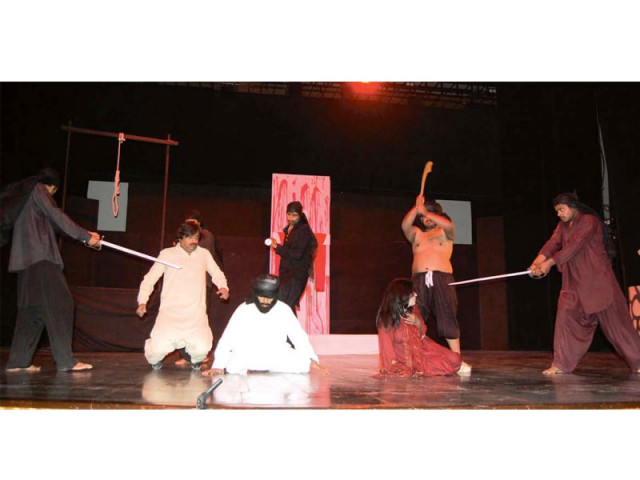Drama festival: The hangman’s mind and superstition galore
The third and fourth plays in the series explore two poignant issues.

Two more plays brought food for thought for those following the drama festival at Pakistan National Council of the Arts (PNCA) here on Wednesday and Thursday.
The softer side to a hangman
‘Jallad’ a Punjabi play directed by William Pervez uses the metaphor of a hangman to portray the injustices faced by individuals due to societal prejudices. It focuses on those victimised due to arbitrary constructs such as gender, religion and occupation.
The hangman, who is responsible for the execution of law and society’s alleged perpetrators, is himself shown as a victim of stigmatism over his occupation. Ironically, he is seen as a heartless killer when, in fact, he is just filling a social demand.
The play heavily lent itself to the symbols of the gallows: a well and the crucifix that was a refreshing change from the usual idyllic set. The gallows is an obvious symbol of society always being on the brink of collapse. The crucifix evokes Jesus Christ dying for the sins of mankind and heightens the innocence of those wrongly accused and killed in the play. The well in contrast, was a unifying symbol, which called attention to the innate similarities of humankind rather than the differences, which in this case would be the need for water to survive.
The ‘jallad’, Sultan (Batin Farooqi), in the play is seen struggling to come to terms with his occupation that was forcibly passed down by his father. He cannot shun his occupation because it is tradition but every life he takes eats away at his own conscience.
When his daughter Rajo (Reeha Yousaf) falls in love with the landlord’s son Sawal (Sawir Khan) is when he questions the unwarranted importance given to occupations. It is then that he vows to let nothing stand in the way of his daughter’s happiness. Unfortunately, the landlord orders his servants to kill Rajo and despite this grievous blow, Sultan proclaims, “The landlord did not just commit a crime against me or my daughter but a crime against women. I can forgive a criminal but not a murderer of women. This is not my story, it is the story of the mistreatment of women in our society.”
Superstition killed the cat
On Wednesday, the third play in the series “Shaadi ho tu aisi”(How a wedding should be), dissected the role of suspicion and superstition at play in our society.
Written and directed by Saeed Saleem, the play is an apt social commentary on traditional systems of matrimony. Cast member Sapna Shah said, “There is such a pervasive custom of going to ‘najoomis’ in our culture; we need to understand that the only way to truly know or prepare for the future is being the best we can be, not by paying someone to tell us.”
The plot follows two couples: Lubna (Rukhsana Khan) and her beloved Saleem (Saeed Saleem) and Babar (Hameed) and Gul Sapna (Sapna Shah). However given to his superstitious tendencies, Saleem’s father hires a psychic to pick out the marital pairs which leads to the inverting of the pairing. A heartbroken Saleem after much deliberation, finally manages to convince the father that he loves Lubna and that he must marry her.
Though the couple is content with this development, Saleem’s father still insists that the day and timing of the wedding ceremony be decided by a ‘najoomi.’ The first date given by the fortune teller is interrupted by the police who find a stash of heroine in Saleem’s friend’s suitcase whereas the second time, it is interrupted by a robbery.
It is only then that Saleem’s father gives in to an impromptu wedding that goes without a glitch and he comes to realise how futile such rituals are.
The festival will run till December 29, with a new play being staged every day and matinee shows on every Saturday and Sunday at 3pm.
Published in The Express Tribune, December 17th, 2011.



















COMMENTS
Comments are moderated and generally will be posted if they are on-topic and not abusive.
For more information, please see our Comments FAQ